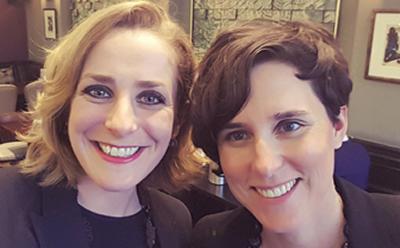iCLIC members contribute to policy debate on intermediary liability

The topic of Intermediary liability is certainly one of the most heavily debated in the information society. It has implications for a variety of contexts: political elections, fight against terrorism and extremism, prohibition of child pornography and hate speech, data protection, freedom of expression and copyright enforcement, just to mention a few.
iCLIC, Southampton new interdisciplinary Core on Law, Internet and Culture, has been at the forefront of the policy debate over the past few months.
iCLIC Director, Associate Professor Sophie Stalla-Bourdillon, member of the expert Group MSI-NET formed by the Council of Group, has been actively contributing to the drafting of a recommendation on the topic of intermediary liability, which will be made public at the end of the year.
Sophie Stalla-Bourdillon together with Eleonora Rosati also enthusiastically engaged in the policy debate at the European level in the wake of the release of a proposal for a new Copyright Directive, by taking the lead in writing an open letter signed by 40 European academics and submitting it to a number of EU institutions, including the European Commission, the European Parliament and the Council.
The open letter was followed by an extended statement to further highlight the most problematic shortfalls of the proposal. Sophie released the extended statement in Paris in November 2016 during a conference on the role and liability of online platforms that iCLIC jointly organised with La Sorbonne.
Constructive discussions with representatives of the European Commission, the European Parliament and the authors of the extended statements subsequently took place in December 2016, which made it possible for both iCLIC members to explain their concerns.
The statement recommended a comprehensive re-assessment of Article 13 of the proposal in the light of the Charter of Fundamental Rights of the European Union and the E-commerce Directive (in particular Article 15) including Court of Justice of the European Union case law: the proposal for a new Copyright Directive appears incompatible with both of these texts. Essentially this is because Article 13, read together with Recitals 38 and 39, appears to impose a general monitoring obligation on some intermediary providers, which is contrary to Article 15 of the E-commerce Directive.
The findings of the open letter and extended statements have been taken seriously by MEPs.
In a note produced in December 2016 by the Ex-Ante Impact Assessment Unit for the European Parliament’s Committee on Legal Affairs (JURI), it was noted that the option chosen by the European Commission seems to introduce a general monitoring obligation (“Moreover, Article 15 of the E-Commerce Directive prohibits Member States from requiring intermediaries to impose general monitoring duties regarding the information they store. Yet, option 2 seems to introduce such a general monitoring obligation”).
On 20 February 2017, in a draft opinion, the Committee on the Internal Market and Consumer Protection for the Committee on Legal Affairs (IMCO), of which the rapporteur is Ms Catherine Stihler, expressed the view that the current wording of Article 13 of the proposal for a new copyright Directive “is incompatible with the limited liability regime provided for in Directive 2000/31/EC (Electronic Commerce Directive), a piece of legislation that has proven to be enormously beneficial for the internal market in the digital sphere.”
It remains to be seen how the amendments proposed by this draft opinion will evolve. iCLIC members remain committed to continue engaging productively with policy makers and stakeholders.